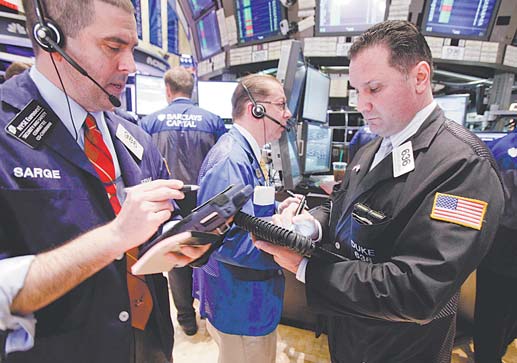Can stock market pick next president?

Traders work on the floor of the New York Stock Exchange. The Dow Jones industrial average has soared 62 percent since President Barack Obama took office.
Associated Press
NEW YORK
The number has been repeated so often by presidential prognosticators that it’s an article of faith: No president has been re-elected since World War II with an unemployment rate higher than 7.2 percent.
But the stock market turns out to be a pretty good predictor, too.
The Dow Jones industrial average has soared 62 percent since President Barack Obama took the oath of office during some of the darkest days of the Great Recession. The Dow was just below 8,000 then and stands near 13,000 today.
If a recent study of stock markets and presidential elections is any guide, Obama can start preparing his second inaugural address.
“There’s something to this,” says Phil Orlando, chief equity market strategist at Federated Investors, the $370 billion investment firm.
There are plenty of other signs often consulted for their political forecasting power, like whether a team from the National Football Conference or the American Football Conference wins the Super Bowl.
This one makes a little more sense: When the economy picks up and unemployment falls, confident investors put money into riskier investments and stocks rise. Voters are likely to reward the sitting president with another four years.
“The stock market reflects trends in the economy,” Orlando says. And as any political operative can attest, in a presidential campaign, it’s the economy — you know the rest.
The study was backed by the Socionomics Institute, a think tank studying how a shared mood among a group sways its members’ actions. Their researchers dug up data on economic output, prices, unemployment and stock-market performance and matched them to presidential elections.
They went all the way back to the first re-election in 1792, when George Washington beat John Adams and won a second term as the president.
The researchers found a solid connection between the stock market’s direction in the three years leading up to Election Day and the election results. Gains of 20 percent or more for the Dow nearly assured victories for sitting presidents. Drops of 10 percent or worse got them tossed out.
In recent successful re-election campaigns, the connection appears clear. Ronald Reagan won re-election in 1984 after the Dow’s 41 percent surge and despite an unemployment rate of 7.2 percent. Bill Clinton was awarded a second term after the Dow gained 63 percent in the three years leading up to Election Day.
 43
43
